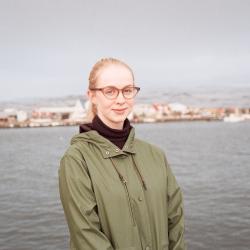Indriði is famous for his guitar playing in the Icelandic punk band Muck. He is also part of the experimental collective Sagitaria Raga, and has collaborated with artists like Úlfur Hansson and Jófríður Ákadóttir. Since the release of his first solo album, Indriði has been performing at various venues in New York. Listen to the magical ‘Makril’ on Soundcloud.
Afogtil
“Afogtil” is Icelandic and means “every now and then.” It’s a song about missing but also about moving on, which is a continuous theme of the whole album. It features an excellent trombone melody by my friend Aaron Roche, who performs on other songs on the album as well. He’s the guy lurking behind that tree on the album cover and on the back.
Dreamcat
“Dreamcat” is about disappointment, and how you keep on truckin’ through your fantasies and desires. Dreaming is good fuel but can also become a sort of hiding place, not meant for winter, it is a summer bummer, so put on the shades.
SternaParadísa
I wrote this song in a dream and it is the first time I’ve ever managed to document a dream track. I woke up in the morning, sat up in my bed and grabbed my guitar, which was sleeping right next to me. I recorded a little demo and then went back to sleep.
Guitarplay
A notion derived from the idea of the perpetual-motion machine, an idea of things that exist solely to serve their own purpose and revolve only around themselves. An example would be standing on one foot and moving by kicking oneself in the standing foot with the other one, thus moving in a circle. A tape machine contains a tape that records itself playing a guitar with its own tape on itself.
Undiraldan
Albert Finnbogason, who mixed the album, did a lot of excellent producing on this, playing guitar and creating beats and arrangements. He opened my ears to the mellotron. This is the oldest song on the album and in the end I say “calming the quiet emptiness” in Icelandic.
Djésenda
“Djésenda” is an Icelandic word for “descend.” Tumi Árnason had some beautiful chord ideas for his saxophone part and the song also features Alexandra Drewchin’s vocals. She doesn’t say any words but sings, more like a woodwind. The song once had lyrics but the only thing left of it now is the title. I wrote it in the church in a beautiful town in Iceland called Seyðisfjörður while the crew was having lunch.
Apar
This one is an ode to recklessness and getting wasted. All the tracks were recorded late at night after drinking booze and having fun; that’s also why this song is so sloppy. I recorded it with my friends Aaron, Alexandra and Adam, who played the drums. I was the only one wearing headphones and it took me ages to set up the microphones and connect the cables so they started laughing at me and referred to me as Rick Rubin throughout the session. After giving up on the headphone mixer I just led the tempo with hand gestures and a tambourine. When I got back to Iceland, Tumi recorded the saxophone at five in the morning, layer on top of layer.
Gæsin og Minkurinn
A man once told me to start writing about the things in front of me so one night when I’d seen a goose chase a mink into the ocean, I decide to write about it. I realised that you can simply write about something that is happening in front of you and what is occupying your mind will automatically creep through the text. For me writing lyrics is often about working fast and spontaneously, it’s all about making choices and doing the right thing after the exact right amount of time thinking about it.
Asenda
“Asenda” is an Icelandic word for “ascend.” It was the last song I wrote before going to the studio to record. I wrote the lyrics in Miklatún in Reykjavík and the lyrics are based on sites in the neighbourhood where my mom’s house is, like Tjörnin and Norðurmýrin.
Buy subscriptions, t-shirts and more from our shop right here!
















